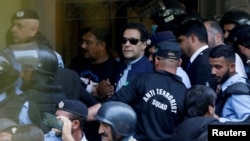A special court in Pakistan indicted Imran Khan, the jailed former prime minister, and his deputy Monday on disputed charges of leaking state secrets.
The tribunal conducted the closed-door hearing inside a prison near the capital, Islamabad, under a century-old colonial-era law known as the Official Secrets Act.
"Today's hearing was exclusively meant to indict both of them; therefore, the court read out the charge openly," Shah Khawar, the special prosecutor, told reporters outside the Adiala Jail. He said that the court had formally commenced the trial in the case and summoned the witnesses at the next hearing on Friday.
Khan, 70, and co-defendant Shah Mahmood Qureshi, a former Pakistani foreign minister, pleaded not guilty, their attorneys said. They pledged to challenge the indictment in a higher court.
The lawsuit stems from a March 2022 classified Pakistani diplomatic cable, internally known as a cipher, that Khan alleged documented the United States' role in toppling his government with the help of his country's powerful military a month later. The cipher was written by Pakistan’s then-ambassador to the United States, Asad Majeed Khan.
The cipher purportedly quoted Donald Lu, the U.S. assistant secretary of state for the Bureau of South and Central Asian Affairs, as asking the ambassador to tell his military leadership it should remove Khan from office through a parliamentary vote of no-confidence because of his government's neutrality over the war in Ukraine.
The deposed cricket star-turned-prime minister was in Moscow for official talks with President Vladimir Putin on the day Russia launched its full-scale invasion in February 2022.
Coincidently, an opposition alliance moved a no-confidence vote a day after the ambassador met with the U.S. officials, eventually bringing down the Khan government in April of that year because several of his party lawmakers and coalition partners had also defected allegedly under pressure from the military.
The State Department, while commenting on the reported cipher content, said this past August that Washington had objected to Khan's visit to Russia, but played no role in his removal from power.
While in office, Khan had convened an emergency meeting of his national security committee, comprising top civilian and military leaders, to review the cipher.
The meeting condemned the U.S. for its alleged interference in Pakistan's politics, and the U.S. ambassador in Islamabad was subsequently summoned to the foreign ministry so Islamabad could formally lodge a "strong protest."
Washington and the Pakistani military have denied Khan's allegations.
The deposed prime minister was jailed in August for three years over corruption charges he rejected as politically motivated and fabricated by the military. A higher court later overturned his sentence and ordered authorities to release him on bail. But Khan was instead kept in custody on allegations he had leaked the contents of the cipher to the public for political gain.
Khan discussed details of the cipher at party rallies and during media interviews in the run-up to the controversial no-confidence vote and continued doing so after his dismissal. Khan maintained he was doing so lawfully because he was bound to inform Pakistanis about "the foreign conspiracy" against the government they had elected.
Defense lawyers said that if found guilty, the former Pakistani leader and Qureshi could be sentenced to life in prison or even the death penalty. However, the lawyers said they were confident their clients would be acquitted, saying the clients had committed no crime.
While reading the charge sheet Monday to Khan, the judge said Khan “illegally retained and wrongly communicated secret document [cipher] telegram” sent from Washington on March 7, 2022, to the Pakistani foreign ministry.
The judge went on to read that the cipher “was relating to top secret information” between the state of the United States and Pakistan, “which you accused used in a prohibited place [Jalsa or public rally], and you willfully communicated the said cipher document… to unauthorized persons.”
A spokesman for Khan on legal matters, Naeem Panjutha, said Monday that the indictment was carried out "in haste" in an apparent bid to conclude the trial quickly to punish "our incarcerated national hero."
"A trial conducted within a secret courtroom with no access to public or media, other than a couple of defense lawyers, is neither fair nor in line with the constitutional requirement of due process," Panjutha said in a video statement.
Aitzaz Ahsan, a prominent Supreme Court lawyer and former law minister, said Monday that the cipher case would not stand the scrutiny of a higher court. He explained to reporters that Pakistan's constitution authorizes a prime minister, in line with his oath, to "de-cipher a cipher" or to "declassify a classified document" if he finds a foreign nation is threatening his elected government.
A U.S. news outlet, The Intercept, published the purported text of the cipher for the first time in August.
Separately, Pakistan's Supreme Court outlawed military trials of dozens of Khan supporters Monday, binding authorities to try the suspects in civilian courts instead.
An army-backed crackdown on Khan’s Pakistan Tehreek-e-Insaf, or PTI, party has led to the arrests of hundreds of political activists, including women. More than 100 people have been handed over to the military for trial in its tribunals, which are solely meant for personnel of Pakistan's armed forces.
The suspects face charges of storming army installations during anti-government protests last May. Khan rejects the accusations, saying the military wants to punish him and dismantle his party to keep him from returning to power. The army has not commented on the allegations.
Khan remains the most popular national political leader, and the opposition PTI is rated as the country's largest political party, according to recent public surveys.
The military has staged repeated coups against elected prime ministers since Pakistan gained independence from Britain in 1947 and ruled the country for more than three decades. Analysts and former Pakistani leaders say the army significantly influences policymaking even when it is not in power.





